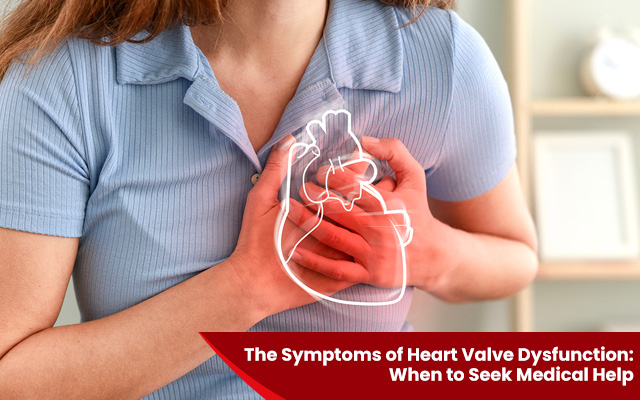Heart valve dysfunction is a condition that often goes unnoticed until its symptoms become severe. Unfortunately, many people ignore early signs that could indicate a problem with their heart valves. The heart valves regulate blood flow, and any malfunction can severely affect overall heart health.
In this blog, we will discuss the common symptoms of heart valve dysfunction, when to seek medical help, and how to find the best treatment from the best cardiologists in Mukundapur.
What is Heart Valve Dysfunction?
It refers to a condition where one or more of the heart’s valves do not function properly. The heart has four valves: aortic, mitral, pulmonary, and tricuspid, which control the flow of blood through the heart and into the rest of the body. When these valves are damaged or malfunction, it can disrupt blood flow and cause various symptoms.
Types of Heart Valve Dysfunction
There are two main types of heart valve dysfunction:
- Valve Stenosis: This occurs when a valve becomes narrowed, making it difficult for blood to flow through the valve.
- Valve Regurgitation (or Insufficiency): This happens when a valve does not close properly, causing blood to leak backwards.
What are the symptoms of Heart Valve Dysfunction?
Heart valve dysfunction refers to when one or more of the heart’s valves are not working properly. This can lead to symptoms that affect the circulatory system, and early diagnosis is crucial to preventing serious complications. Below are some common symptoms of heart valve dysfunction:
Shortness of breath
One of the most noticeable symptoms of heart valve dysfunction is shortness of breath, particularly during physical activity or even while resting. When the valves in the heart are not functioning correctly, the heart cannot pump blood efficiently, causing fluid to accumulate in the lungs.
Fatigue
Feeling unusually tired or weak, even after minimal exertion, is another common sign. This can occur because the heart is not pumping enough oxygenated blood to meet the body’s needs, resulting in persistent fatigue.
Chest Pain or Discomfort
While chest pain may be a sign of various heart conditions, it is also commonly associated with heart valve dysfunction. The chest pain is often sharp and may worsen with physical activity. It is important not to ignore this symptom, as it can indicate severe heart issues.
Swelling in the Legs, Ankles, or Abdomen
Swelling in the legs, ankles, or abdomen occurs when blood backs up in the veins due to inefficient heart pumping. This can also cause discomfort and affect mobility.
What causes Heart Valve Dysfunction?
Heart valve dysfunction can be caused by a variety of factors, and recognising these risks early can help you take proactive steps toward heart health. Here are some of the most common causes:
Age-Related Wear and Tear
As we age, the heart valves naturally become weaker. Over time, they may become less effective at closing properly, leading to valve regurgitation (a leaky valve) or stenosis (a narrowed valve).
Congenital Heart Defects
Some individuals are born with heart valve defects that may not cause immediate problems but can eventually lead to dysfunction as they age.
Rheumatic Heart Disease
Rheumatic fever, often resulting from a strep throat infection, can damage the heart valves. This damage can lead to valve dysfunction years after the infection occurs.
How is Heart Valve Dysfunction treated?
Heart valve dysfunction is a treatable condition, and treatment options depend on the severity of the condition. Treatment may involve:
Medications
Doctors may prescribe medications to relieve symptoms like swelling and shortness of breath. Diuretics may be used to reduce fluid buildup, and blood thinners can prevent blood clots from forming due to improper valve function.
Surgery or Valve Replacement
In more severe cases, surgery may be needed to repair or replace a damaged valve. The most common surgeries for heart valve dysfunction include valve repair and valve replacement surgeries, which can be done through traditional open surgery or minimally invasive techniques.
Lifestyle Changes
Maintaining a healthy lifestyle, including a balanced diet, regular exercise, and avoiding smoking, can improve heart health and prevent further complications.
Conclusion
Heart valve dysfunction is a serious condition that can significantly affect your heart health. Early identification of symptoms such as shortness of breath, fatigue, and chest pain is vital for timely diagnosis and treatment. Depending on the severity, treatment may involve medications, surgery, or lifestyle changes. Prompt medical attention when symptoms appear can help prevent complications and improve your quality of life.
The best cardiologists in Mukundapur at Long Life Super Speciality Clinic offer a comprehensive evaluation and personalised treatment plan. Book your consultation today.

